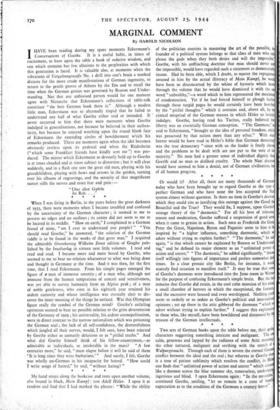When I was living in Berlin, in the years before
the great darkness of 1933, there were moments when I became troubled and confused by the uncertainty of the German character ; it seemed to me to possess no edges and no outlines ; its centre did not seem to me to be located in its middle. "How on earth," I complained to a German friend of mine, "am I ever to understand you people?" "You should read Goethe," he answered, "the solution of the German riddle is to be found in the works of that great man." I acquired the admirable Grossherzog Wilhelm Ernst edition of Goejhe pub- lished by the Inselverlag in sixteen neat little volumes. I read and read and read. I became more and more bored by Goethe, who seemed to me to bear no relation whatsoever to what was being done and thought in Germany at the time. And it was then, for the first time, that I read Eckermann. From his simple pages emerged the figure of a, man of immense serenity ; of a man who, although not immune from the human temptations of conceit and sensitiveness, was yet able to survey humanity from an Alpine peak ; of a man of noble gentleness, who even in his eightieth year retained his ardent curiosity and whose intelligence was eternally alert to dis- cover the inner meaning of the things he noticed. Was this Olympian figure really the symbol of the German mind? Goethe's unfailing optimism seemed to bear no possible relation to the grim determinism of the Germany of 1929; his universality, his ardent cosmopolitanism, were in direct contrast to the narrow nationalism which was poisoning the German soul ; the lack of all self-confidence, the distrustfulness which jangled all their nerves, would, I felt sure, have been rejected by Goethe either as unmanly delusions or as "pitiful truths." And what did Goethe himself think of his fellow-countrymen,—so admirable as individuals, so intolerable in the mass? "A few centuries more," he said, "must elapse before it will be said of them 'It is long since they were barbarians.'" And surely, I felt, Goethe was wholly um-German in his incapacity for hatred. "How could I write songs of hatred," he said, "without hating? "


























 Previous page
Previous page